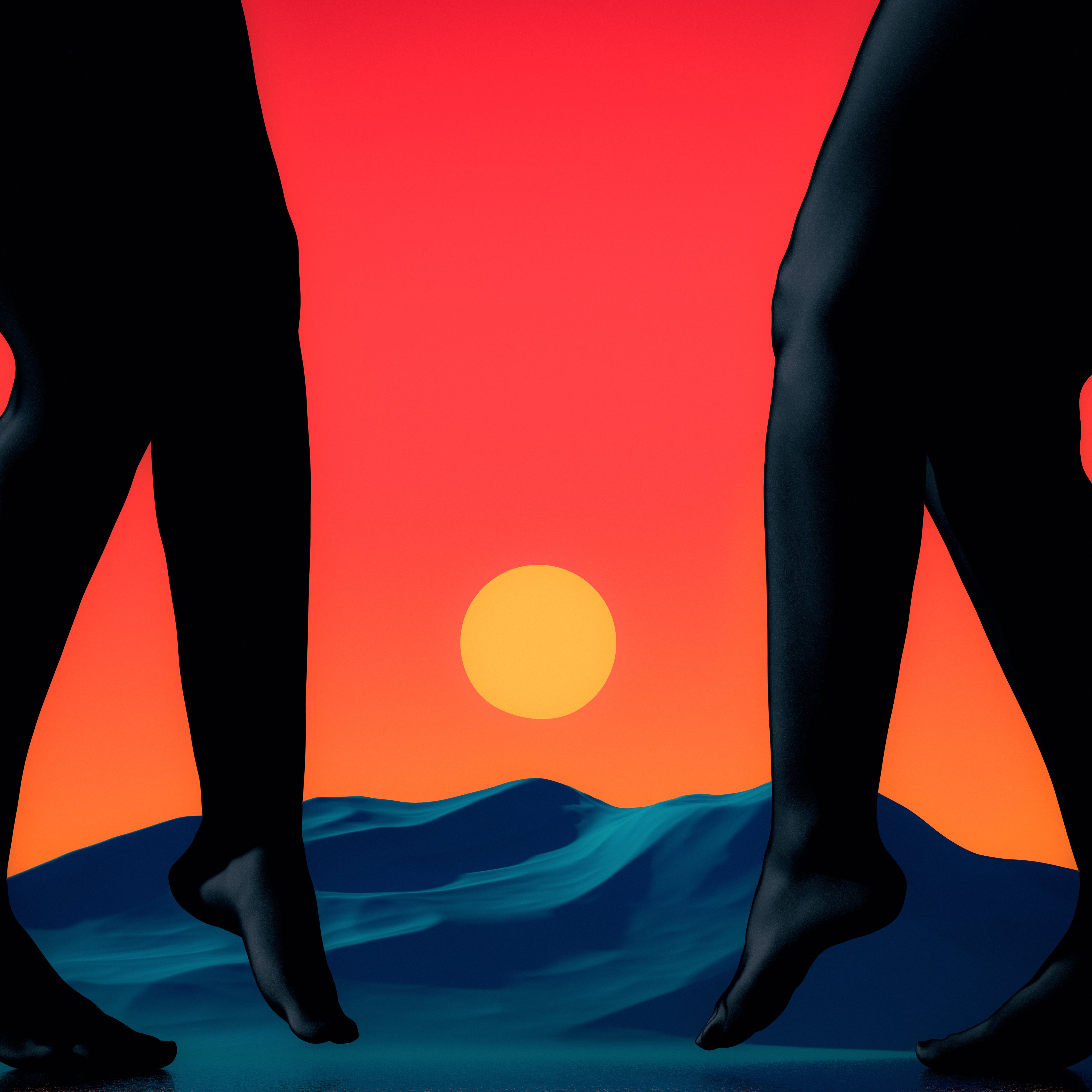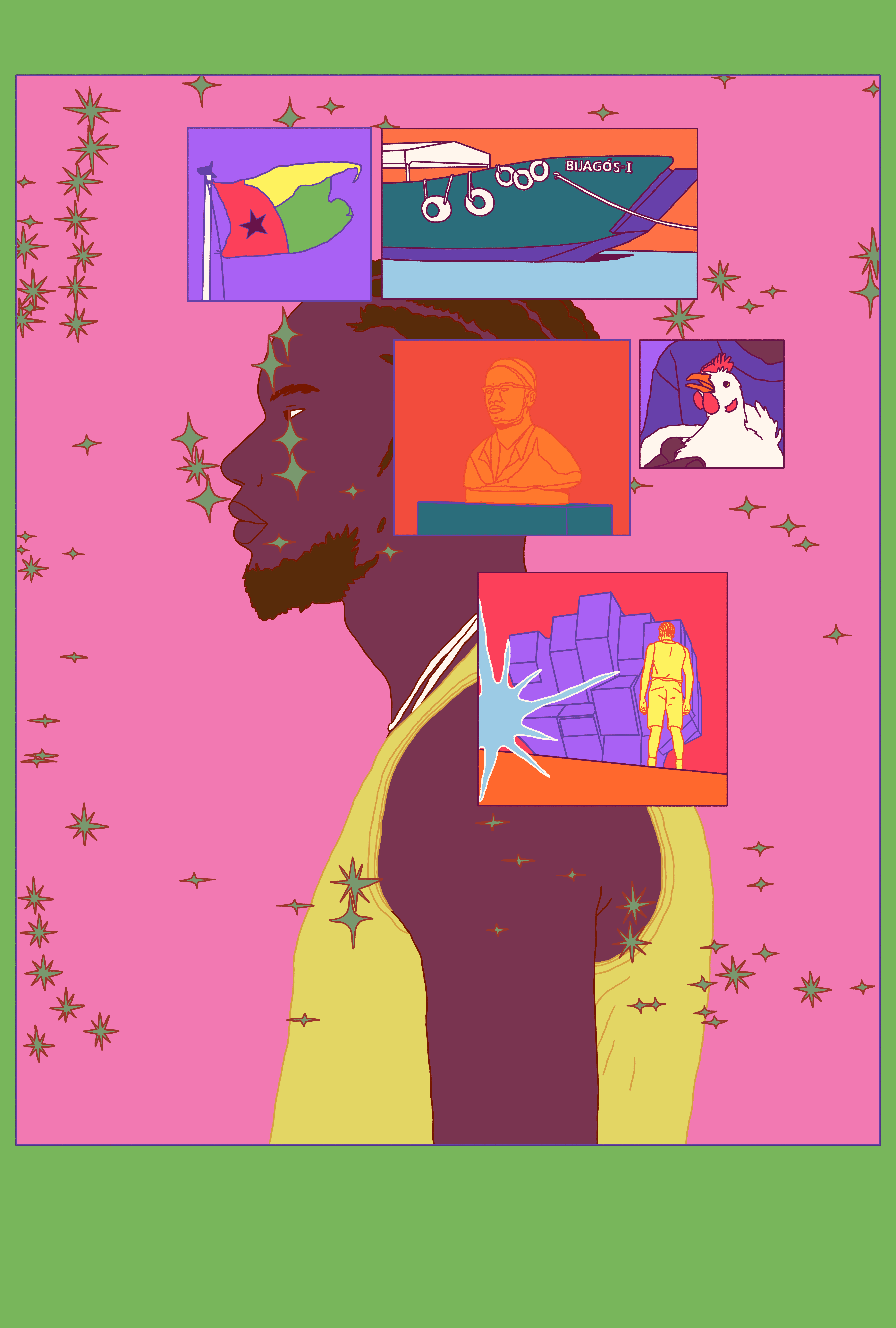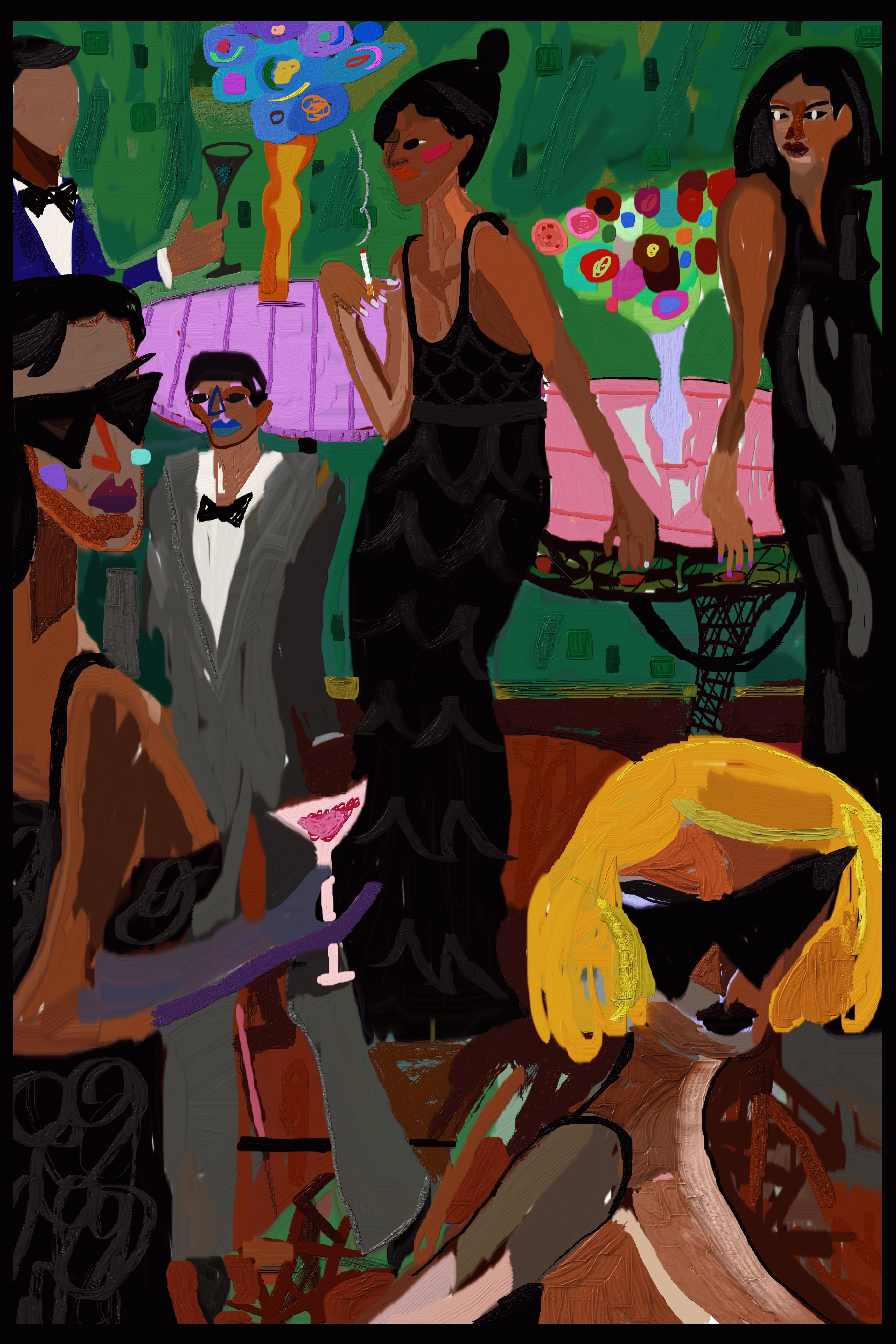Black Means Rare
Over the past ten years, only 1% of the global art market was spent on works by artists who identified as black.
Blackness in any art space, the blockchain or otherwise, is rare. I mean this as a celebration: we are here, in spite of everything, and our work is of value. I also mean this in revolt: there could be many more of us and much more from us to love. I truly hope this exhibit gives you a little taste of what I mean.
— Linda Dounia Rebeiz, Curator of BLACK*RARE
What are some of the challenges, big and small, that you face(d) being a Black artist? 1. Access. One of the big reasons my most prominent art right now is digital-based is that I cannot afford the materials to create visual art traditionally, especially not with the vibrancy and texture that best honours my creative vision.
2. Identity/appearance. My work affirms a lot of people – people who look and love and live like me – but it is also vulgar to a lot of other people. I spend almost as much time fielding hateful responses to my art as I do receiving warmth from the people who are affirmed by it. Apparently Black queer and trans people with fat bodies can’t even exist freely in art. I’m a (smol) fat Black queer and trans person so I know what it means to move through the world as someone possessing multiple markers of deviance and vulgarity. It’s jarring still to have that also projected onto my art.
What about your culture and history are you most proud to share through your art? I’m a Black South African, but something about a country created through colonialist visions doesn’t feel like something I can be fully affirmed by. So I’m not patriotic. I also grew up in a Christian home (I’m a pastor’s kid) so culture in the traditionalist sense is something I’m estranged from. That is on the mend though. The culture I feel most solidly a part of is Black queer and trans culture – a culture that is defined by deliberateness, rebellion, self-determination, and taking up space. In most of my paintings, there are usually a lot of markers (be it clothing, hairstyles, tattoos with pronouns or symbols) of Black queerness and Black transness. We have to make ourselves conspicuous to one another, so we can find each other and also so we can preserve existing evidence of our presence here and create new archives of who we are for future Black queer and trans people. My art is immediately and obviously an ode to Black queerness and transness specifically, and the folks who love and affirm my work most are always able to find it (and me). It’s pretty dope.
What are some of the challenges, big and small, that you face(d) being a Black artist? As an artist that started in Barbados, it was hard to have my sales directly benefit my life there because of a lack of accessibility to funds. Also, it has been hard to build an IRL community as NFTs in Barbados and Toronto are slowly growing.
What about your culture and history are you most proud to share through your art? I think it is important to diversify our idea of the Caribbean and I do this through showcasing the vernacular architectural features of the Chattel House.
What brought you to the NFT space and why are you choosing to stay involved? During the pandemic, I lost my part-time job and freelance gigs. I would use some of my unemployment money to invest in Crypto because I was tired of feeling expendable. Then a friend of mine, Lyonna, posted about NFTs on her IG, and I fell down the rabbit hole. When I minted my genesis, it was sold in minutes, which blew my mind, but what got me was when the collector/homie, Sirsu, took it a step further and introduced me to the people in the community that I now call family, and that’s why I’m choosing to get involved because that is the kind of culture that I want to help cultivate.
If there is one thing you can change about or add to the NFT space, what would it be? There are so many of us out there that can benefit from web3 technology. Still, not a lot of people know what it is. Especially these days, with counter opinions on NFTs, many people are apprehensive about being in the space, so I guess it would be cool if we had more educational outreach and resources, especially for marginalized communities.
What about your culture and history are you most proud to share through your art? The hair, the faces, the bodies, the clothes. The pure magnificence of the black culture.
What brought you to the NFT space and why are you choosing to stay involved? The technology brought me here. The space is beautiful and full of extremely smart people building something we have never seen before. I fell in love with tech, even more, since I’ve come into the NFT space. I choose to stay involved so that I can build and help others build.
What are some of the challenges, big and small, that you face(d) being a Black artist? At times, it can feel we are being championed under the umbrella term of Black or African art only when society decides it’s that time of the year. That is why I appreciate the efforts of SuperRare and the curator of this show for their efforts to extend the promotion of artists like myself beyond just Black History Month.
What about your culture and history are you most proud to share through your art? The palm trees that are iconic to the West African landscape combined with the deserts & dunes found in North Africa. I have a big appreciation for the power of landscapes and our connection with nature as a species. My work does not conform to traditional notions of what is considered African art and works to actually break those archaic stereotypes with my blend of surrealism & Afrofuturism. Digital art should be respected on the same level as its counterparts and I’m excited to show the world exactly that.
What are 5 things everyone should know about you?
- I am an Afro-diasporic Brazilian artist who brings the history of her ancestry in her works.
- I am a multi-disciplinary artist with a focus on digital painting
- My work focuses on exploring Black memory, with a focus on lesbian affection.
- I am the co-founder of an artistic collective named Terroristas del Amor, whose work has been published in Vogue Brasil.
- Through NFTs, I have participated in my first physical exhibition of crypto art in Frankfurt, at the Greulich Gallery.
What are some of the challenges, big and small, that you face(d) being a Black artist? In Brazil, the lack of investment in the arts means that jobs in the sector are always precarious, especially for Black people. As a result, they trigger the consolidation of various structures of oppression: low pay, devaluation of work, etc. cultural facilities are mostly managed by white men and veiled racism permeates these places. Furthermore, as a lesbian woman, I have constantly had to deal with LGBTQIA+phobic situations and heteronormative institutions. These institutions are unproductive and violent spaces that should instead exist to facilitate the production of young artists from the periphery, like me.
What about your culture and history are you most proud to share through your art? I’m proud of the diversity that exists where I’m from, Ghana, and I always find ways to incorporate the entire breadth and expanse of my culture into my work. It is through my art-making practice that I continue to learn about the varied histories of my parents’ and grandparents’ ethnicities, the connected cultures of surrounding tribes and peoples, and about my Afrikan heritage as a whole.
So be it the fascinating intricacies of my people’s kente-weaving, the mystery of Adinkra and our exquisite writing systems, our folklore, mythologies, and cosmogonies – I’m proud of it all and I enjoy finding ways to blend them into all that I do.
If there is one thing you can change about or add to the NFT space, what would it be? I think it would be amazing if the NFT space was built around prioritizing the voices of the most disenfranchised communities. Since the whole ethos of the blockchain is steeped in creating new financial and more democratic models of value exchange and governance, I really wish the NFT space was more intentional about actively seeking out ways to level the playing field, instead of rewarding those who already have so much and also have typically had the loudest voices.
What are some things everyone should know about you? I care about artists and African art and I’m proud to be African and Zimbabwean. I am always trying to build an ecosystem that eliminates barriers and hurdles that people face. I am also a huge fan of music – it inspires all my work. Lastly, I am an afrofuturist at heart.
What are some of the challenges, big and small, that you face(d) being a Black artist? I think because I’m bi-racial, I always had to fight who I was in public and was ridiculed for it growing up. There is also the fact that I have to have to work harder because of the colour of my skin to be visible.
What are some of the challenges, big and small, that you face(d) being a Black artist? I think one of the biggest is being compared to the only other black artist that someone might know like a Basquiat for example – what might be meant as a compliment actually lands as a microaggression. Another issue is the negative stigma around art that some of us grow up with. It’s difficult for our families to see it as a viable profession and this is a challenge many people have to face in trying to become artists.
What brought you to the NFT space and why are you choosing to stay involved? As a digital artist, I find the idea of tokenizing a digital asset fascinating but coming from Zimbabwe the crypto space allows me to help my family out with my earnings given the political and economic structure of the country – which I’m sure a lot of Africans can relate to. One thing I really appreciate is that the NFT space pushes me to be a better artist. I live for seeing people enjoy and revel in my art – it resolves some things in me.
What are some of the challenges, big and small, that you face(d) being a Black artist? Getting into galleries with digital art has been almost impossible for me – finding exactly how to find a space for the kind of work I make which sits at the intersection of photography, illustration, digital painting, and traditional painting.
What brought you to the NFT space and why are you choosing to stay involved? I found out about NFTs 5 or 6 months before minting my first piece. One of my IRL collectors and a friend of mine convinced me to put my art on the blockchain. I feel like I have found a home for my digital art with NFTs, not just that but also a tribe in the Cyberbaat collective – a community willing to give me an audience, and fellow creative friends with identities and stories I can relate to.
What are some of the challenges, big and small, that you face(d) being a Black artist? As a Black woman artist, there are a number of challenges that ultimately become emotionally and physically exhausting. I’m a bit used to it all by now that I’ve detached from it, but it is frustrating to have to constantly be ‘othered’ and having to fight for visibility, opportunity, or financial backing. It’s already difficult to contend with decolonizing one’s survival instinct, but on top of being an artist, it just feels all-consuming at times. As a Black artist, for me, it can feel like a dark comedy with how often diversity measures will be studied or implemented once something racist, culturally insensitive, or intentionally exclusionary or inequitable happens. It can feel like a nonstop array of projections and no room to grow when people simply box your art in with just being ‘Black’. Likewise, as a woman, there are a lot of moments of gaslighting when everyone looks to you for the answers, yet offers no support back and renders you invisible. Sometimes it feels like people just want to execute a marketing plan so they can appear diverse via ‘representation.’ It used to feel really difficult to make room for mental health convos. I think one of the most frustrating things is being the subject of discourse every day, yet it is incredibly difficult to secure funding for Black artists & projects. Meanwhile, the people who grow in engagement discussing diversity will secure more opportunities easily. It’s a frustrating challenge and feels like our identities can be weaponized at our expense nearly every day. Somewhere along the way, ‘representation’ got watered down to underrepresented communities wanting to just see themselves instead of having access, equity, and systemic change. As a Black artist, it can feel like you can’t escape from just being allowed to be and exist. Instead of funding our work and projects, we have to contend with the fact that it’ll be harder to get financing because some people don’t want diversity or inclusion, but the irony is we’re then asked to help said people understand through D&I initiatives.
If there is one thing you can change about or add to the NFT space, what would it be? I guess the whole point of this space being groundbreaking is that it’s permissionless and decentralized, so of course, bad people will be using this tech but I’d love to have better storytellers telling the narrative. It’s a shame celebrity and racist PFP projects make attention whenever NFT’s get talked about because there are some brilliant people who would only be huge additions to making sure we progress & keep racism, transphobia, homophobia, and inequity out of the web3 infrastructures that are necessary for our communities and the world going forward. Likewise, with more storytellers, I’d love to see more artists discussing financial opportunities beyond NFT’s in web3 like fellowships, retreats, or UBI. Possibilities are so abundant ????
Art

Curated Conversations: ALIENQUEEN
SuperRare Labs Senior Curator An interviews ALIENQUEEN about psychedelics, death, and her journey in the NFT space.
Tech


Out of the Vault and onto the Chain: the Evolving Nature of Provenance
SuperRare editor Oli Scialdone considers the social experience of provenance and its relationship with community in the Web3 space.
Curators' Choice



Curated Conversations: ALIENQUEEN
SuperRare Labs Senior Curator An interviews ALIENQUEEN about psychedelics, death, and her journey in the NFT space.









